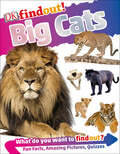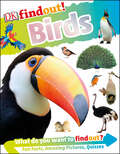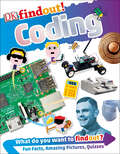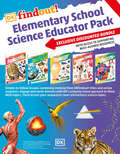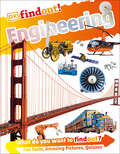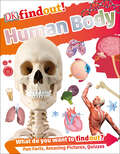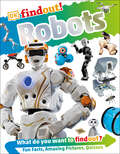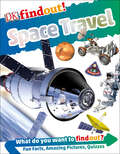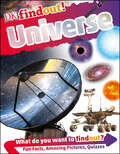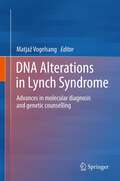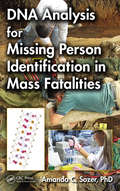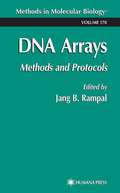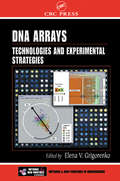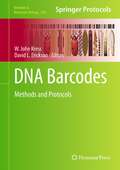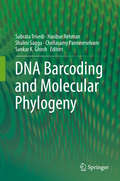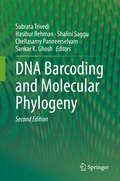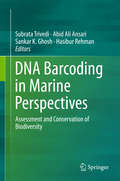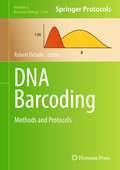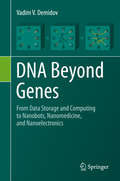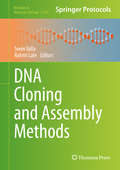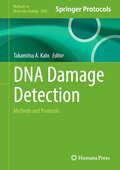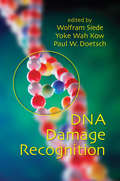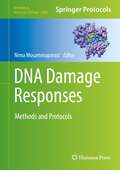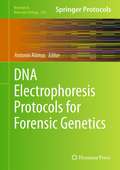- Table View
- List View
DKfindout! Big Cats (DK findout!)
by DKSupporting STEM-based learning, this fact-filled book for animal lovers ages 6–9 is the ultimate guide to the mightiest members of the cat family, entertaining and educating young readers through a combination of close-up images, quirky trivia facts, quiz questions, and fascinating tidbits on ferocious felines like tigers, lions, and leopards.What&’s the difference between big cats and wild cats? Which big cat is the only one that is unable to roar? What makes cheetahs the fastest animals on land? Find out the answers to these questions and more in DKfindout! Big Cats, which features stunning wildlife photography of these incredible creatures in their native environments. Kids will learn about the physical components of big cats from around the world—including patterned fur coats, retractable claws, and superior senses—and how these components work together to power some of the deadliest predators found anywhere today. From playful hijinks to nighttime prowling, DKfindout! Big Cats captures the world of these awe-inspiring animals in a unique and fun way.Vetted by educational consultants, the DKfindout! series drives kids ages 6–9 to become experts on more than 30 of their favorite STEM- and history-related subjects, whether Vikings, volcanoes, or robots. This series covers the subjects that kids really want to learn about—ones that have a direct impact on the world around them, like climate change, space exploration, and rapidly evolving technology—making learning fun through amazing images, stimulating quizzes, and cutting-edge information. The DKfindout! series is one that kids will want to turn to again and again.
DKfindout! Birds (DK findout!)
by DKSupporting STEM-based learning, this fact-filled book for bird lovers ages 6–9 is the ultimate guide to nearly 150 bird species from across the globe, entertaining and educating young readers through a combination of close-up images, quirky trivia facts, quiz questions, and fascinating tidbits on everything from toucans to turkeys.How many species of birds are in the world today? What do bird feathers and human hair have in common? Why do some bird species let ants crawl on them? Find out the answers to these questions and more in DKfindout! Birds, which features stunning wildlife photography of birds in their native environments, throughout every stage of their life cycles. Beginning with a broad overview of bird biology, this book teaches young ornithologists what makes birds different from other branches of the animal kingdom, while &“fact files&” provide a closer look at bird species that share particular habitats, like deserts and rain forests. From mating to migrating and everything in between, DKfindout! Birds captures the breadth of the bird world in a unique and fun way.Vetted by educational consultants, the DKfindout! series drives kids ages 6–9 to become experts on more than 30 of their favorite STEM- and history-related subjects, whether Vikings, volcanoes, or robots. This series covers the subjects that kids really want to learn about—ones that have a direct impact on the world around them, like climate change, space exploration, and rapidly evolving technology—making learning fun through amazing images, stimulating quizzes, and cutting-edge information. The DKfindout! series is one that kids will want to turn to again and again.
DKfindout! Coding (DK findout!)
by DKSupporting STEM-based learning, this fun, fact-filled book for kids ages 6–9 explores the programming that makes our world work, in everyday objects from traffic lights to vending machines. Educating young readers through a combination of close-up images, quirky trivia facts, quiz questions, and fascinating tidbits, it&’s the perfect book for any reader who can&’t get enough of coding.How much did the first laptop weigh? What exactly is a computer bug? How many calculations can the world&’s fastest computer perform in a single second? Find out the answers to these questions and more in DKfindout! Coding, which features photographs and illustrations of gadgets, games, and coding geniuses like Ada Lovelace and Alan Turing. Beginning in the mid-1800s, readers can trace the path of coding pioneers from the birth of the first computer all the way to today&’s tech boom. Along the way, they&’ll learn about the fundamentals of coding languages like Java and Python—including their application in everything from cars to calculators—and how coding continues to revolutionize tech, gaming, medicine, space travel, and more.Vetted by educational consultants, the DKfindout! series drives kids ages 6–9 to become experts on more than 30 of their favorite STEM- and history-related subjects, whether Vikings, volcanoes, or robots. This series covers the subjects that kids really want to learn about—ones that have a direct impact on the world around them, like climate change, space exploration, and rapidly evolving technology—making learning fun through amazing images, stimulating quizzes, and cutting-edge information. The DKfindout! series is one that kids will want to turn to again and again.
DKfindout! Elementary Science Pack (DK findout!)
by DKA discounted bundle for educators that includes five elementary science titles from the DKfindout! series-Animals, Earth, Energy, Human Body, and Science-and access to supporting curriculum resources on the DKfindout! website.Perfect for use by teachers with children ages 5-10, the DKfindout! Elementary Science Pack provides access to:Print and digital information resources for both offline and online methods of learningEngaging, high-quality content aligned to curriculumTeacher lesson sequences and planningThis pack contains high-quality, accessible nonfiction ebooks that focus on topics tied to curriculum and aligned with Next Generation Science Standards. In the true DK way, the DKfindout! series is characterized by highly visual and colorful page layouts with a mix of photographs, diagrams, boxes, bursts, timelines, and short chunks of text that make information easily digestible and learning fun for kids.But this pack makes things easy for you, the teacher, too. With instructions on how to obtain access to six free learning pathways-each outlining between eight and twelve lessons written by an experienced educator-and at-home support materials for guardians with additional activities and experiments, this pack serves as an affordable, one-stop resource for several weeks of teaching. And the free-to-use, child-safe encyclopedic DKfindout! website allows both you and your students to take learning even further with more fascinating topics, more amazing images, and more interactive quizzes.The DKfindout! Elementary Science Pack will make your next set of science lessons easy to implement and even more fun for your students, whether you're teaching remotely, in person, or homeschooling your own children. Once you have completed and received your purchase, head to the DKfindout! website and create a teacher account to get started.
DKfindout! Energy (DK findout!)
by Emily DoddSupporting STEM-based learning, this fact-filled book for kids ages 6–9 is the ultimate guide to energy and its role in building a more sustainable future. Entertaining and educating young readers through a combination of close-up images, quirky trivia facts, quiz questions, and fascinating tidbits, it&’s the perfect book for fueling kids&’ interest in the natural forces that shape our world.Why does your hair stick to a balloon? What are fossil fuels made from? Why does ice cream feel cold when we eat it? Find out the answers to these questions and more in DKfindout! Energy, which features photographs of scientific experiments and illustrative examples of basic energy principles. From the discovery of fire to the development of the nuclear reactor, scientific breakthroughs throughout history have led to modern energy applications, like Marie Curie&’s research on radioactivity, which is still used in cancer treatments today. Readers will also delve into future energy issues and their possible solutions.Vetted by educational consultants, the DKfindout! series drives kids ages 6–9 to become experts on more than 30 of their favorite STEM- and history-related subjects, whether Vikings, volcanoes, or robots. This series covers the subjects that kids really want to learn about—ones that have a direct impact on the world around them, like climate change, space exploration, and rapidly evolving technology—making learning fun through amazing images, stimulating quizzes, and cutting-edge information. The DKfindout! series is one that kids will want to turn to again and again.
DKfindout! Engineering (DK findout!)
by DKDiscover the STEM subject of engineering with this children&’s book full of photographs and illustrations, fascinating facts, and engaging challenges—from the creators of DKfindout.com, DK&’s free online resource for kids.Did you know that engineers designed and built the Pyramids and the iPad? Or that the world&’s largest jumbo jet can carry 853 passengers? Find out how!Perfect for budding engineers who want a highly visual STEM book to increase their engineering know-how, DK findout! Engineering is sure to inspire the next science fair project or school report. Inside, author Dr. Emily Hunt breaks down what engineering is and how it changes our world. With this DK findout! book, you will:- See how concepts such as levers, wheels and axles, and pulleys work- Read about great engineers in history, such as Leonardo da Vinci, Alexander Graham Bell, and Yoky Matsuoka - Explore steam engines, rocket technology, robotics, flying machines, bridges, and buildings- Learn about the history and exciting future of engineering- Hear from real-life engineer and maker Dr. Lucy Rogers about what it&’s like to be an engineer today- Fold out the cover for an engineering quiz, timeline, and careers guide- and find out much, much more!The DK findout! series of kids books helps children become experts on their favorite nonfiction subjects, from dinosaurs and ancient civilizations to space, coding, and cutting-edge technology. Learn more about engineering—and everything else—at www.dkfindout.com, the award-winning free educational website.
DKfindout! Human Body (DK findout!)
by DKFrom gooey gastric juices to our amazing brains, and everything in the human body in between, this book will give kids the knowledge they want about how our bodies work.DK findout! Human Body introduces kids to the complex system that is our body, from head to toe. Nerves and organs, spines and skulls, plus all the gooey stuff that fascinates kids like digestion, waste and smelly business are discussed with text and images appropriate for kids 6 to 9 years old.Series Overview: The DK findout! series helps kids ages 6–9 become experts on their favorite subjects—from dinosaurs to Ancient Rome to computer coding. Each book focuses on a specific topic and makes learning fun through amazing images, stimulating quizzes, and cutting-edge information kids are eager to know.
DKfindout! Robots (DK findout!)
by Nathan LeporaThis fun, fact-filled book for kids ages 6–9 guides readers through the science behind the abilities of life-like robots, and how these humanoids might become even more advanced in the future. Supporting STEM-based learning and educating young readers through a combination of close-up images, quirky trivia facts, quiz questions, and fascinating tidbits, it&’s the perfect book for any reader who can&’t get enough of robots.When were robots first dreamed up? What does an industrial robot do? How do robots sense the world around them? Find out the answers to these questions and more in DKfindout! Robots, which features photographs of drones, automata, and other machines from all around the world. Readers will learn about the different types of robots and the famous engineers who created them, and gain insight into how robots think and learn through illustrated charts, diagrams, and blocks of coding language. From the industrial and medical fields to entertainment and home security, kids will discover the many ways robots can improve our lives—and our futures—as they read DKfindout! Robots.Vetted by educational consultants, the DKfindout! series drives kids ages 6–9 to become experts on more than 30 of their favorite STEM- and history-related subjects, whether Vikings, volcanoes, or robots. This series covers the subjects that kids really want to learn about—ones that have a direct impact on the world around them, like climate change, space exploration, and rapidly evolving technology—making learning fun through amazing images, stimulating quizzes, and cutting-edge information. The DKfindout! series is one that kids will want to turn to again and again.
DKfindout! Space Travel (DK findout!)
by DKSupporting STEM-based learning, this fact-filled book for kids ages 6–9 is the ultimate guide to astronauts, rockets, and the future of space exploration. Entertaining and educating young readers through a combination of close-up images, quirky trivia facts, quiz questions, and fascinating tidbits, it&’s the perfect book for any kid who loves learning about outer space.Who was the first person to reach space? How long did the longest recorded spacewalk last? What is the Arecibo message, and how can it help us contact intelligent extraterrestrial life? Find out the answers to these questions and more in DKfindout! Space Travel, which features photographs of space shuttles, satellites, telescopes, and the experts who operate them. This book guides kids through the technical details of space travel, from the planning and operating of government-led missions to the designing of the first fleet of spacecraft for civilian tourists. Readers will also get an unrivaled look at life in space, learning about the rigorous training and exercise that space explorers must undergo both before and after liftoff.Vetted by educational consultants, the DKfindout! series drives kids ages 6–9 to become experts on more than 30 of their favorite STEM- and history-related subjects, whether Vikings, volcanoes, or robots. This series covers the subjects that kids really want to learn about—ones that have a direct impact on the world around them, like climate change, space exploration, and rapidly evolving technology—making learning fun through amazing images, stimulating quizzes, and cutting-edge information. The DKfindout! series is one that kids will want to turn to again and again.
DKfindout! Universe (DK findout!)
by DKExplore stars, galaxies, and our incredible universe with this children&’s book full of photographs and illustrations, fascinating facts, and engaging challenges—from the creators of DKfindout.com, DK&’s free online resource for kids.Did you know that the sun takes 240 million years to make one orbit around the Milky Way? Or that astronauts learn what it feels like in space by training underwater? Find out why!Perfect for all young Earthlings who want a highly visual STEM book to increase their space know-how, DK findout! Universe is sure to inspire the next amazing science fair project or school report. Inside, author Giles Sparrow breaks down the universe and our place in it.With this DK findout! book, you will:- See meteors, comets, asteroids, and the eight planets of our solar system- Learn how astronomers measure cosmic distances using light-years- Read about amazing astronauts, such as Buzz Aldrin and Neil Armstrong- Discover how people have tried to contact aliens over the years using space probes, satellite dishes, and radio signals- Explore night-sky star constellations like Cassiopeia, Centaurus, and Ursa Major- Hear from real-life expert Suzanna Randall what it's like to be an astronomer today- and find out much, much more!The DK findout! series of kids books helps children become experts on their favorite nonfiction subjects, from dinosaurs and ancient civilizations to space, coding, and cutting-edge technology. Learn more about space—and everything else—at www.dkfindout.com, the award-winning free educational website.
DNA Alterations in Lynch Syndrome: Advances in molecular diagnosis and genetic counselling
by Matjaž VogelsangLynch syndrome (LS) is the most common cause of inherited colorectal cancer, a disease with a high mortality rate. An estimated 37,000 of diagnosed colorectal cancer cases worldwide are attributed to Lynch syndrome each year. Intensive cancer screening, with early initiation and frequent follow-up, can reduce colorectal cancer incidence and mortality in LS patients. This book provides an up-to-date overview on the genetic and epigenetic basis of Lynch syndrome. It evaluates clinical features of the disease and critically comments on molecular tools available for identifying mutations responsible for Lynch syndrome; in addition the importance of functional assays that can help clarify the clinical nature of identified mutations is also discussed. The book also focuses on challenges in genetic counselling of at-risk individuals and discusses related ethical issues. The purpose of the book is to give a concise knowledge base for the broader scientific and medical community, including genetic counselors, in order to improve awareness on the potential impact that the diagnosis of LS has on treatment, management and surveillance of LS patients.
DNA Analysis for Missing Person Identification in Mass Fatalities
by Amanda C SozerAdvances in DNA technology have expanded such that forensic DNA profiling is now considered a routine method for identifying victims of mass fatalities. Originating from an initiative funded by a grant from the U.S. Department of State, DNA Analysis for Missing Person Identification in Mass Fatalities presents a collection of training modules that
DNA Arrays
by Jang B. RampalIn DNA Arrays: Methods and Protocols, Jang Rampal and a authoritative panel of researchers, engineers, and technologists explain in detail how to design and construct DNA microarrays, as well as how to hybridize them with biological samples for analysis. In step-by-step instructions, these experts detail not only how to attach or print arrays on various matrices, but also biological sample preparation (DNA and RNA), hybridization conditions, signal detection, probe optimization, different printing technologies, and data collection and analysis (bioinformatics). Additional topics covered include genotyping, sequencing by hybridization, antisense reagents, HLA-DQA typing techniques, and gene expression analysis. Forward-looking and state-of-the-art, DNA Arrays: Methods and Protocols provides all investigators engaged in biological and biomedical research the full range of effective, readily reproducible microarray techniques needed to analyze on a large scale the many different genes and gene sequences now available from the Human Genome Project.
DNA Arrays: Technologies and Experimental Strategies (Frontiers in Neuroscience)
by Elena V. GrigorenkoA quantum leap in technology took place a few years ago with the introduction of cDNA arrays that have been developed in response to the need for simultaneous analysis of the patterns of expression of thousands of genes. DNA Arrays: Technologies and Experimental Strategies offers a view of different aspects of this rapidly developing technology, in
DNA Barcodes
by Ida Lopez David L. EricksonA DNA barcode in its simplest definition is one or more short gene sequences taken from a standardized portion of the genome that is used to identify species through reference to DNA sequence libraries or databases. In DNA Barcodes: Methods and Protocols expert researchers in the field detail many of the methods which are now commonly used with DNA barcodes. These methods include the latest information on techniques for generating, applying, and analyzing DNA barcodes across the Tree of Life including animals, fungi, protists, algae, and plants. Written in the highly successful Methods in Molecular BiologyTM series format, the chapters include the kind of detailed description and implementation advice that is crucial for getting optimal results in the laboratory. Thorough and intuitive, DNA Barcodes: Methods and Protocols aids scientists in continuing to study methods from wet-lab protocols, statistical, and ecological analyses along with guides to future, large-scale collections campaigns.
DNA Barcoding and Molecular Phylogeny
by Subrata Trivedi Sankar K. Ghosh Hasibur Rehman Shalini Saggu Chellasamy PanneerselvamThis book includes a multitude of aspects of DNA barcoding and molecular phylogeny along with some case studies which will be beneficial to researchers and academics around the globe in a total of 27 chapters. Bioinformatics is an important part of DNA barcoding and the concept of R in DNA Barcoding is a very recent development. This book contains a full chapter devoted to this very important topic. Further areas where DNA barcoding can be applied are: management of invasive alien species, plant animal interactions, forensic botany, clinical microbiology especially in relation to infection management, DNA database management, among others. This book also includes very useful information related to the DNA barcoding and molecular phylogeny of microbes, aquatic plants, algae, mosquitoes, elasmobranchs, fishes, reptiles, birds and ruminant mammals. Some unique case studies describe DNA barcoding of reptiles dwelling in Saudi Arabian deserts, DNA barcoding of a high altitude medicinal plant, genetic variation studies in both wild and hatchery populations of Anabas testudineus, DNA Barcoding and molecular phylogeny of Ichthyoplankton and juvenile fishes of Kuantan River in Malaysia.
DNA Barcoding and Molecular Phylogeny
by Subrata Trivedi Sankar K. Ghosh Hasibur Rehman Shalini Saggu Chellasamy PanneerselvamThis book presents a comprehensive overview of DNA barcoding and molecular phylogeny, along with a number of case studies. It discusses a number of areas where DNA barcoding can be applied, such as clinical microbiology, especially in relation to infection management; DNA database management; and plant -animal interactions, and also presents valuable information on the DNA barcoding and molecular phylogeny of microbes, algae, elasmobranchs, fishes, birds and ruminant mammals. Furthermore it features unique case studies describing DNA barcoding of reptiles dwelling in Saudi Arabian deserts, genetic variation studies in both wild and hatchery populations of Anabas testudineus, DNA barcoding and molecular phylogeny of Ichthyoplankton and juvenile fishes of Kuantan River in Malaysia, and barcoding and molecular phylogenetic analysis of indigenous bacteria from fishes dwelling in a tropical tidal river. Moreover, since prompt identification and management of invasive species is vital to prevent economic and ecological loss, the book includes a chapter on DNA barcoding of invasive species. Given its scope, this book will appeal not only to researchers, teachers and students around the globe, but also to general readers.
DNA Barcoding in Marine Perspectives
by Abid Ali Ansari Subrata Trivedi Sankar K. Ghosh Hasibur RehmanMore than two third area of our planet is covered by oceans and assessment of marine biodiversity is a challenging task. With the increasing global population, there is a tendency to exploit marine recourses for food, energy and other requirements. This puts pressure on the fragile marine environment and necessitates sustainable conservation efforts. Marine species identification using traditional taxonomical methods are often burdened with taxonomic controversies. Here in this book we will discuss the comparatively new concept of DNA barcoding and its significance in marine perspective. This molecular technique can be useful in the assessment of cryptic species which is widespread in marine environment and linking the different life cycle stages to the adult which is difficult to accomplish in the marine ecosystem. Other advantages of DNA barcoding include authentication and safety assessment of seafood, wildlife forensics, conservation genetics and detection of invasive alien species (IAS). Global DNA barcoding efforts in the marine habitat include MarBOL, CeDAMar, CMarZ, SHARK-BOL, etc. DNA barcoding of different marine groups ranging from the microbes to mammals is to be revealed. In conjugation with newer and faster techniques like high throughput sequencing, DNA barcoding is serving as an effective modern tool in marine biodiversity assessment and conservation.
DNA Barcoding: Methods and Protocols (Methods in Molecular Biology #2744)
by Robert DeSalleThis volume covers the latest advancements and methods used to study DNA barcoding. The chapters in this book are organized into six parts: theory, DNA manipulation, specialized barcoding methods, analysis of DNA barcodes, completing a successful DNA barcode project, and barcoding as citizen science. Part One looks at several theoretical issues in DNA barcoding concerned with DNA barcodes that can and should be used. Part Two discusses protocols for processing samples into DNA barcodes, including DNA isolation, sequencing and managing samples, and the resulting DNA barcodes. Part Three explores the next generation of DNA barcoding such as FRET-based detection, dual nanopore detection, skimming, and closed-tube methods. Part Four addresses programs and websites that handle DNA barcoding data, and includes character-based approaches, barcode gap methods, integrated approaches, and Barcode of Life Database. Part Five offers protocols for producing a successfulDNA barcoding project including plant and animal examples and protocols for generating a DNA Barcode Reference Library. Lastly, Part Six talks about several novel protocols for setting up an educational program using DNA barcodes. Written in the highly successful Methods in Molecular Biology series format, chapters include introductions to their respective topics, lists of the necessary materials and reagents, step-by-step, readily reproducible laboratory protocols, and tips on troubleshooting and avoiding known pitfalls.Cutting-edge and thorough, DNA Barcoding: Methods and Protocols encompasses a wide range of techniques and will be a useful reference tool for both scientist and student.
DNA Beyond Genes: From Data Storage and Computing to Nanobots, Nanomedicine, and Nanoelectronics
by Vadim V. DemidovThis is the first book portraying to a wide readership many fields of DNA in the world of materials altogether in a single volume. The book provides underlying concepts and state-of-art developments in the emerging fields of DNA electronics, structural DNA nanotechnology, DNA computing and DNA data storage, DNA machines and nanorobots. Future possibilities of innovative DNA-based technologies, such as DNA cryptography, DNA identity tags, DNA nanostructures in biosensing and nanomedicine, as well as DNA-based nanoelectronics are all covered, too. This book is valuable for university students studying engineering and technology; biotech, nanotech, and medical device R&D managers, practitioners and investors; and IP analysts who would like to extend their background in advanced DNA technologies. It is nicely illustrated, which makes it very readable, and it conveys science and principles in a lively language to appeal to a broad audience, from professionals and academics to students and lay readers. Advance Praise for DNA Beyond Genes:“Most students of DNA, and lay readers as well, are interested in the absolutely essential role it plays in biology. However, the properties which make DNA the carrier of genetic information also make it an extraordinary material that can be used as the backbone for a wide variety of nanoengineering applications – these range from information storage and computation to molecular machines and devices to artfully designed logos and symbols. The perfect self-recognition of DNA sequences makes it an ideal building block to synthesize more and more elaborate constructions and imaginative scientists have probably only just scratched the surface of what can eventually be created. Here for the first time in this wonderful book Vadim Demidov explores the full range of the non-biological applications of DNA.”Charles R. CantorProfessor Emeritus of Biomedical Engineering, Boston University Member of the USA National Academy of Sciences
DNA Cloning and Assembly Methods
by Svein Valla Rahmi LaleIn DNA Cloning and Assembly Methods, expert researchers in the field detail many of the methods which are now commonly used for DNA cloning and make cloning procedures faster, more reliable and also suitable for high-throughput handling. These include methods and protocols that are based on several mechanisms including type II and IIS restriction enzymes, single stranded annealing, sequence overlap, and recombination. With additional chapters on software programs that are suitable for primer design, a feature crucial for the functionality of the described methods. Written in the highly successful Methods in Molecular Biology series format, chapters include introductions to their respective topics, lists of the necessary materials and reagents, step-by-step, readily reproducible laboratory protocols, and key tips on troubleshooting and avoiding known pitfalls. Authoritative and practical, DNA Cloning and Assembly Methods seeks to provide scientist with a valuable and useful resource for wet lab researchers within life sciences.
DNA Damage Detection: Methods and Protocols (Methods in Molecular Biology #2933)
by Takamitsu A. KatoThis volume explores techniques in DNA damage analysis, important not only for understanding cellular health after exposure to genotoxic agents but also for assessing cellular ability of genome maintenance. The book explores traditional DNA damage measurement methods, as well as modern fluorescence-based analysis and high throughput automatic analysis methods. Written for the highly successful Methods in Molecular Biology series, chapters include introductions to their respective topics, lists of the necessary materials and reagents, step-by-step and readily reproducible laboratory protocols, and tips on troubleshooting and avoiding known pitfalls. Practical and timely, DNA Damage Detection: Methods and Protocols serves as an ideal guide for readers who are unfamiliar with DNA damage as well as experts seeking protocols to adapt to their own research.
DNA Damage Recognition
by Wolfram Siede Yoke Wah Kow Paul W. DoetschStands as the most comprehensive guide to the subject-covering every essential topic related to DNA damage identification and repair.Covering a wide array of topics from bacteria to human cells, this book summarizes recent developments in DNA damage repair and recognition while providing timely reviews on the molecular mechanisms employe
DNA Damage Responses: Methods and Protocols (Methods in Molecular Biology #2444)
by Nima MosammaparastThis volume provides detailed methods and key approaches used to mechanistically study DNA damage, as well as the factors involved in the damage response. Chapters guide readers through proteomics and biophysical approaches, analyzing protein function, quantifying DNA replication dynamics and nucleic acid base damage, as well as biochemical reconstitution of key pathways involved in DNA repair. Written in the highly successful Methods in Molecular Biology series format, chapters include introductions to their respective topics, lists of the necessary materials and reagents, step-by-step, readily reproducible laboratory protocols, and tips on troubleshooting and avoiding known pitfalls. Authoritative and cutting-edge, DNA Damage Responses: Methods and Protocols aims to be a useful practical guide to researches to help further their study in this field.
DNA Electrophoresis Protocols for Forensic Genetics
by Antonio AlonsoForensic DNA profiling procedures are mainly based on high resolution and high throughput capillary electrophoresis separation and detection systems of PCR amplicons obtained from DNA genomic markers with different inheritance patterns. In DNA Electrophoresis Protocols for Forensic Genetics, expert researchers in the field detail many of the protocols and methods which are now commonly used to perform forensic DNA profiling. It includes protocols for profiling of autosomal STRs, Y-STRs, X-STRs, autosomal SNPs, INDELS, Y-SNPs, mtDNA-SNPs, and mtDNA hypervariable regions HV1 and HV2 . Protocols for molecular identification of non-human species and mRNA profiling for body fluid identification are also included. Written in the highly successful Methods in Molecular BiologyTM series format, chapters include introductions to their respective topics, lists of the necessary materials and reagents, step-by-step, readily reproducible laboratory protocols, and key tips on troubleshooting and avoiding known pitfalls.
